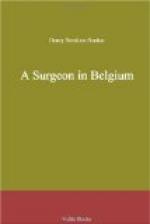IX. A Pause
The life of a hospital at the front is a curious mixture of excitement and dullness. One week cases will be pouring in, the operating theatre will be working day and night, and everyone will have to do their utmost to keep abreast of the rush; next week there will be nothing to do, and everyone will mope about the building, and wonder why they were ever so foolish as to embark on such a futile undertaking. For it is all emergency work, and there is none of the dull routine of the ordinary hospital waiting list, which we are always trying to clear off, but which is in reality the backbone of the hospital’s work.
When we first started in Antwerp, the rush of cases was so great as to be positively overwhelming. For more than twenty-four hours the surgeons in the theatre were doing double work, two tables being kept going at the same time. During that time a hundred and fifty wounded were admitted, all of them serious cases, and the hospital was full to overflowing. For the next ten days we were kept busy, but then our patients began to recover, and many of them had to go away to military convalescent hospitals. The wards began to look deserted, and yet no more patients arrived. We began to think that it was all a mistake that we had come, that there would be no more fighting round Antwerp, and that we were not wanted. Indeed, we canvassed the possibilities of work in other directions, and in the meantime we drew up elaborate arrangements to occupy our time. There were to be courses of lectures and demonstrations in the wards, and supplies of books and papers were to be obtained. Alas for the vanity of human schemes, the wounded began to pour in again, and not a lecture was given.




